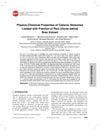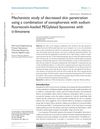 14 citations,
September 2012 in “Journal of nanoscience and nanotechnology”
14 citations,
September 2012 in “Journal of nanoscience and nanotechnology” Niosomes with rice bran extract could be useful for anti-hair loss products.
6 citations,
August 2016 in “Journal of microencapsulation” The hair lotion with methyl myristate in niosomes treats grey hair faster and better than the free form.
 21 citations,
April 2012 in “European Journal of Pharmaceutics and Biopharmaceutics”
21 citations,
April 2012 in “European Journal of Pharmaceutics and Biopharmaceutics” The gel with special fat-loaded particles from rice bran could be an effective skin treatment for hair loss.
 6 citations,
May 2023 in “European journal of pharmaceutical sciences”
6 citations,
May 2023 in “European journal of pharmaceutical sciences” Niosomes are the most effective at delivering drugs to the skin with minimal absorption into the body.
 2 citations,
August 2019 in “International Journal of Applied Pharmaceutics”
2 citations,
August 2019 in “International Journal of Applied Pharmaceutics” Niosomes can effectively deliver Superoxide Dismutase to hair follicles, potentially helping prevent hair loss.
 72 citations,
December 2012 in “Expert Opinion on Drug Delivery”
72 citations,
December 2012 in “Expert Opinion on Drug Delivery” Niosomes are promising for skin drug delivery, offering benefits like improved drug penetration and stability.
 260 citations,
January 2019 in “Pharmaceutics”
260 citations,
January 2019 in “Pharmaceutics” Niosomes are a promising, stable, and cost-effective drug delivery system with potential for improved targeting and safety.
 15 citations,
October 2012 in “InTech eBooks”
15 citations,
October 2012 in “InTech eBooks” Niosomes are a promising and effective way to deliver drugs through the skin.
 130 citations,
August 2020 in “Drug Design Development and Therapy”
130 citations,
August 2020 in “Drug Design Development and Therapy” Nanoparticles can improve skin drug delivery but have challenges like toxicity and stability that need more research.
 39 citations,
September 2016 in “Expert Opinion on Drug Delivery”
39 citations,
September 2016 in “Expert Opinion on Drug Delivery” New drug delivery methods can make natural compounds more effective and stable.
 14 citations,
April 2021 in “Biology”
14 citations,
April 2021 in “Biology” Thai rice bran extracts, especially from Tubtim Chumphae rice, can significantly reduce the activity of hair loss genes, with x-tocopherol showing potential as an anti-hair loss product.
 7 citations,
January 2022 in “Plants”
7 citations,
January 2022 in “Plants” Rice husk and bran extracts from the Bue Bang 3 CMU variety can potentially treat hair loss due to their antioxidant, anti-inflammatory, and anti-androgenic properties.
 42 citations,
January 2021 in “Journal of Clinical Medicine”
42 citations,
January 2021 in “Journal of Clinical Medicine” Microneedle arrays with nanotechnology show promise for painless drug delivery through the skin but need more research on safety and effectiveness.
1 citations,
February 2023 in “Plants” BB4CMU rice bran oil may help treat hair loss and gray hair.
 6 citations,
December 2015 in “International journal of nanomedicine”
6 citations,
December 2015 in “International journal of nanomedicine” Using sonophoresis can make it harder for certain drug-loaded liposomes to get through the skin.
2 citations,
December 2021 in “Pharmaceutics” Finasteride-loaded proniosomes effectively promote hair growth in mice.

Arabica coffee pulp extract may help prevent hair loss and promote hair growth.
9 citations,
June 2022 in “Plants” Shallot extract may help with hair growth and treating hair loss.
 7 citations,
December 2022 in “Plants”
7 citations,
December 2022 in “Plants” Guava leaf extract may help treat hair loss and protect cells by blocking certain genes and fighting damaging molecules.
 39 citations,
June 2017 in “Journal of Applied Research on Medicinal and Aromatic Plants”
39 citations,
June 2017 in “Journal of Applied Research on Medicinal and Aromatic Plants” Plant-based ingredients are effective and safe for modern skincare products.
 1 citations,
August 2024 in “Polymers”
1 citations,
August 2024 in “Polymers” The P25H5-O microneedles effectively deliver substances through hair follicles and are safe for skin cells.
 61 citations,
June 2010 in “European Journal of Pharmaceutics and Biopharmaceutics”
61 citations,
June 2010 in “European Journal of Pharmaceutics and Biopharmaceutics” Cationic polymers improved liposome stability and increased skin absorption of aciclovir and minoxidil.
 151 citations,
November 2018 in “International Journal of Pharmaceutics”
151 citations,
November 2018 in “International Journal of Pharmaceutics” Nanoparticles improve drug delivery through the skin but more research is needed on their long-term effects and skin penetration challenges.
 14 citations,
February 2021 in “International Journal of Pharmaceutics”
14 citations,
February 2021 in “International Journal of Pharmaceutics” Deer antler velvet serum helps hair grow and is safe for skin.
54 citations,
June 2020 in “Pharmaceutics” New nanocarriers improve drug delivery for disease treatment.
 5 citations,
January 2017 in “Journal of Nanomedicine & Nanotechnology”
5 citations,
January 2017 in “Journal of Nanomedicine & Nanotechnology” Nanoemulgel could be a promising new treatment for hair loss.
 151 citations,
July 2011 in “Archives of Dermatological Research”
151 citations,
July 2011 in “Archives of Dermatological Research” Liposomal systems show promise for delivering drugs through the skin but face challenges like high costs and stability issues.
 24 citations,
November 2009 in “Pharmaceutical Development and Technology”
24 citations,
November 2009 in “Pharmaceutical Development and Technology” Transcutol P best increases Finasteride absorption for hair loss treatment.
 8 citations,
June 2022 in “International Journal of Molecular Sciences”
8 citations,
June 2022 in “International Journal of Molecular Sciences” Tiny particles called extracellular vesicles show promise for skin improvement and anti-aging in facial care but face challenges like low production and lack of research.
 December 2024 in “Pharmaceutics”
December 2024 in “Pharmaceutics” Spironolactone nano-formulations show promise for treating skin disorders, but more research is needed for safety and effectiveness.

























